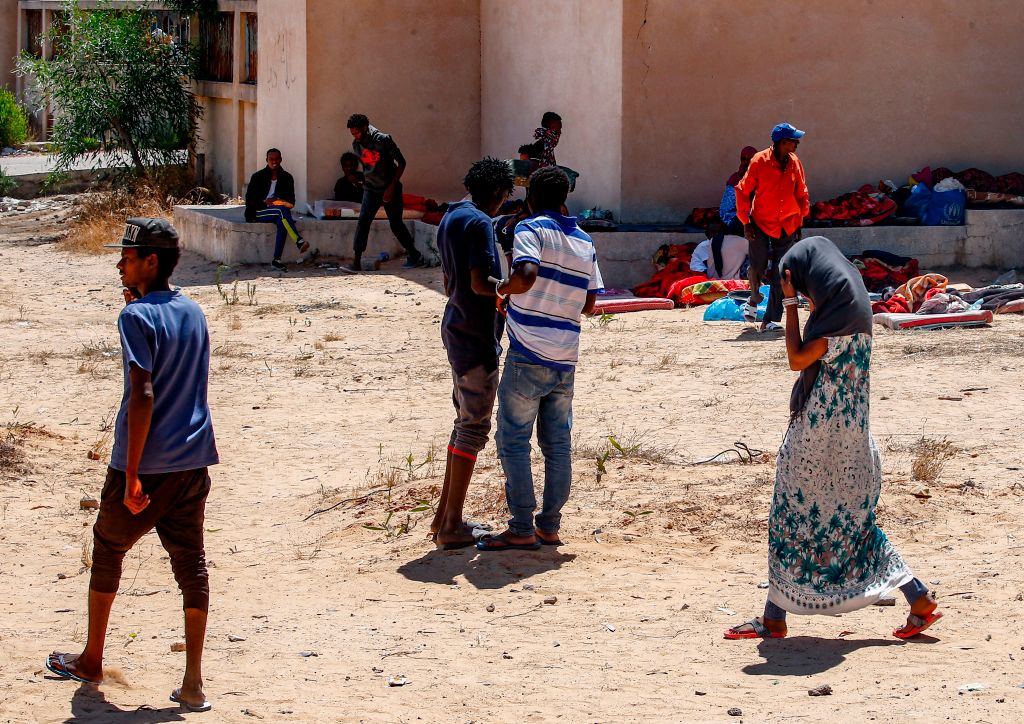The International Criminal Court must order an urgent investigation into an abhorrent attack on the Tajoura immigration detention center in eastern Tripoli, Libya, in which at least 40 refugees and migrants were killed and more than 80 injured, said Amnesty International.
“This deadly attack which struck a detention center where at least 600 refugees and migrants were trapped in detention with no means of escape, and whose location was known to all warring parties, must be independently investigated as a war crime. The International Criminal Court should immediately investigate the possibility that this was a direct attack on civilians,” said Magdalena Mughrabi, Deputy Middle East and North Africa Director at Amnesty International.
“This brutal slaughter is also a sickening reminder of the deadly consequences of Libya and Europe’s callous migration policies. Their cooperation to stem the flow of migrants and refugees means that instead of being offered safe routes out of the country, thousands of people intercepted in the central Mediterranean are returned to Libya where they are arbitrarily detained in centers where they are exposed to torture and mortal danger.”
There are fears the death toll could rise from last night’s attack on the detention center. But even the initial report doubles the civilian death toll since the self-proclaimed Libyan National Army’s (LNA) offensive to capture Tripoli from the internationally-recognized Government of National Accord (GNA) began on April 4, 2019, according to UN figures.
“Most of the victims of the attack were migrants and refugees, many of whom fled bloodshed, persecution or poverty to seek a better life abroad, only to find themselves indefinitely incarcerated in a Libyan detention center near active conflict zones,” said Magdalena Mughrabi.
“This attack should shame all sides into taking immediate action to remove migrants and refugees from areas of active conflict where their lives are endangered and to end their cruel practice of arbitrarily detaining migrants.”
This morning Amnesty International spoke to three refugees detained at Tajoura and who survived the attack. An Eritrean refugee said a first air strike hit a hangar adjacent to the detention center, followed by a second strike that hit the men’s cell at the center itself around five minutes later. Following the attack, up to 300 migrants and refugees – some of whom were returned to Libya after being intercepted in the Mediterranean in recent weeks – are now out in the streets of Tajoura, frightened and waiting for urgent assistance.
The organization has analyzed and verified video footage and photos posted from the scene of the attack, geolocating them to the immigration detention center in Tajoura, which is managed by the General Directorate for Combating Illegal Migration under the Libyan Ministry of Interior. A photo from the men’s cell shows a large crater, several meters across, consistent with the damage caused by an air-dropped bomb.
While it remains to be established who is behind this attack, this week media reports indicated LNA forces had recently received F-16 fighter jets. Such jets are capable of carrying out a night time air strike with larger bombs that would cause damage of this type.
Amnesty International has repeatedly called on warring parties to protect refugees and migrants from attacks and remove them from areas of active conflict and military targets.
The organization’s research indicates that a warehouse used to store weapons was located in the same compound as the Tajoura detention center. Following an airstrike that hit a military vehicle approximately 100 meters from Tajoura detention center on May 7, Amnesty International had warned the Libyan authorities that they were endangering the lives of refugees and migrants by arbitrarily detaining them close to military targets. UNHCR had also called for the urgent relocation to safety of refugees and migrants in detention center located in conflict areas in Tripoli.
Under international humanitarian law all parties to a conflict must take all feasible precautions to minimize the risk to civilians including by delaying or cancelling an attack. Even if the military depot was the intended target of the attack the high number of civilians in close proximity to the area would make this attack unlawful. Parties also must take all feasible measures to protect civilians under their control from the effects of attacks, including by avoiding locating military objectives, such as weapons storage sites, in the vicinity of civilian areas.
Amnesty International’s research also confirmed that some detainees had been forced to work at the military site in Tajoura against their will – also a violation of international law.
“This attack should be a wake-up call for EU states to end their shameful policies outsourcing migration control to Libya in their bid to reduce the number of refugees and migrants arriving on European shores. They can no longer turn a blind eye to the inhuman conditions, torture, rape and other abuse refugees and migrants face, or their failure to support refugees to reach safety by offering sufficient resettlement places,” said Magdalena Mughrabi.
“EU member states should urgently ensure safe routes out of Libya for refugees and migrants trapped in the country and ensure that refugees and migrants rescued in the central Mediterranean are not returned to Libya.”
Amnesty International has warned that breaches of the UN arms embargo on Libya are fuelling violations including war crimes in the battle for Tripoli, which has raged since April 4. More than 100,000 civilians have fled their homes, electricity has been repeatedly knocked out and indiscriminate rocket and artillery attacks have put civilians’ lives in grave danger.

